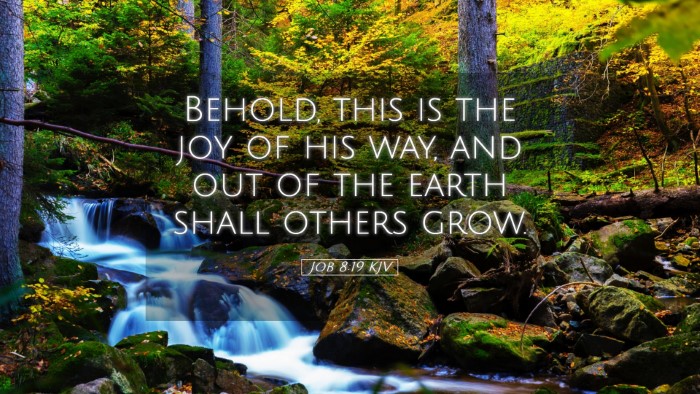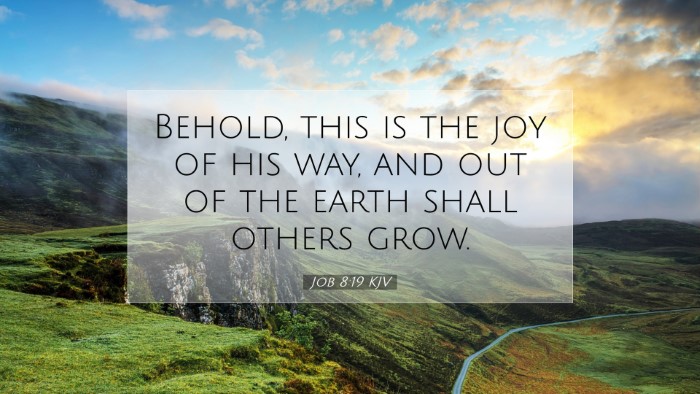Old Testament
Genesis Exodus Leviticus Numbers Deuteronomy Joshua Judges Ruth 1 Samuel 2 Samuel 1 Kings 2 Kings 1 Chronicles 2 Chronicles Ezra Nehemiah Esther Job Psalms Proverbs Ecclesiastes Song of Solomon Isaiah Jeremiah Lamentations Ezekiel Daniel Hosea Joel Amos Obadiah Jonah Micah Nahum Habakkuk Zephaniah Haggai Zechariah MalachiJob 8:19
Job 8:19 KJV
Behold, this is the joy of his way, and out of the earth shall others grow.
Job 8:19 Bible Commentary
Commentary on Job 8:19
Verse Context:
Job 8:19 states, "Behold, this is the joy of his way, and out of the earth shall others grow." This encapsulates Zophar's reflections on the nature of the righteous and the wicked and their ultimate fates. The verse forms part of Zophar’s response to Job’s despair regarding his suffering, illustrating a broader theological question about retribution and the life cycle of the righteous.
Insights from Matthew Henry
Matthew Henry highlights that in this verse, a profound truth about the fate of the wicked is conveyed. He considers it a declaration of how, although the wicked may flourish for a time, their end is ultimately destruction. From Henry's perspective, "the joy of his way" refers metaphorically to the transient happiness of the ungodly, which ultimately results in their demise. The expression "out of the earth shall others grow" can be interpreted to indicate that even when one has fallen, new growth can come out of his remains, suggesting renewal and the continuity of life despite death.
Contributions from Albert Barnes
Albert Barnes takes a more analytical route, suggesting that Job 8:19 can be read as a declaration about the nature of divine justice. He posits that Zophar's statement reflects a common belief in Israelite theology: that prosperity in life is evidence of divine favor, while suffering is a sign of sin. Barnes insists that the metaphor of growth from the earth implies regeneration and the cyclical nature of life. He further emphasizes that this verse encapsulates the error of thinking that the suffering seen in Job’s life negates his righteousness. The overarching principle here, according to Barnes, is that "the righteous may be prospered in the long run, despite the immediate trial they face."
Reflections from Adam Clarke
Adam Clarke’s commentary on this verse delves into the symbolic interpretation of growth. He infers that Zophar’s statement implies revitalization after loss, likening it to the resurrection and ultimate restoration of the righteous. Clarke correlates the “joy of his way” explicitly to the contrast between temporary joy and eternal downfall, providing a balanced view of life’s journey. He notes that the "others" growing out of the earth might refer to the new generation of believers who rise on the ashes of the old, hinting at faith's resilience. This natural imagery resonates with Clarke's emphasis on restoration themes throughout the Scriptures, representing hope and continuity in God’s overarching plan.
Theological Themes and Application
Understanding Divine Justice:
In examining Job 8:19 through these commentaries, theologians will find a rich exploration of the theme of divine justice. The verse suggests that God's governance of the world allows for a temporary flourishing of the wicked, which is often confusing for the faithful. This invites pastors and scholars to explore the complexities of suffering and the apparent prosperity of evil, contributing to an understanding of God’s justice that is deeper than merely the immediate consequences of a person’s actions.
The Cycle of Life and Death:
The imagery of growth invites reflection on the themes of life, death, and resurrection, drawing connections to the Christian understanding of life beyond death. The notion that new life can emerge from the earth, even after the fall of the wicked, underlines a hopeful outlook central to New Testament teachings on resurrection. Thus, this verse is a reminder to anticipate God’s restorative power.
The Role of the Community:
Furthermore, the interpretation of "others grow" evokes consideration of community within the body of Christ. As remnants of the unfaithful fall, new generations and believers will rise, emphasizing the communal aspect of faith where new growth brings forth hope. This serves as an encouragement for pastors to foster environments where spiritual growth can thrive post-suffering.
Pastoral Implications
This verse and its commentary invite pastors to address the visible discrepancy between faithfulness and earthly suffering. When preaching from Job 8:19, it is essential to provide congregations with assurance that their tribulations do not equate to divine displeasure. Instead, they should be encouraged to cling to the truth of restoration and the eventual triumph of the righteous.
In conclusion, the insights gained from Henry, Barnes, and Clarke converge to create a multi-faceted understanding of Job 8:19 that is applicable to both theological study and practical pastoral care, offering a rich tapestry of interpretation that invites further reflection on the nature of justice, suffering, and renewal in the journey of faith.


